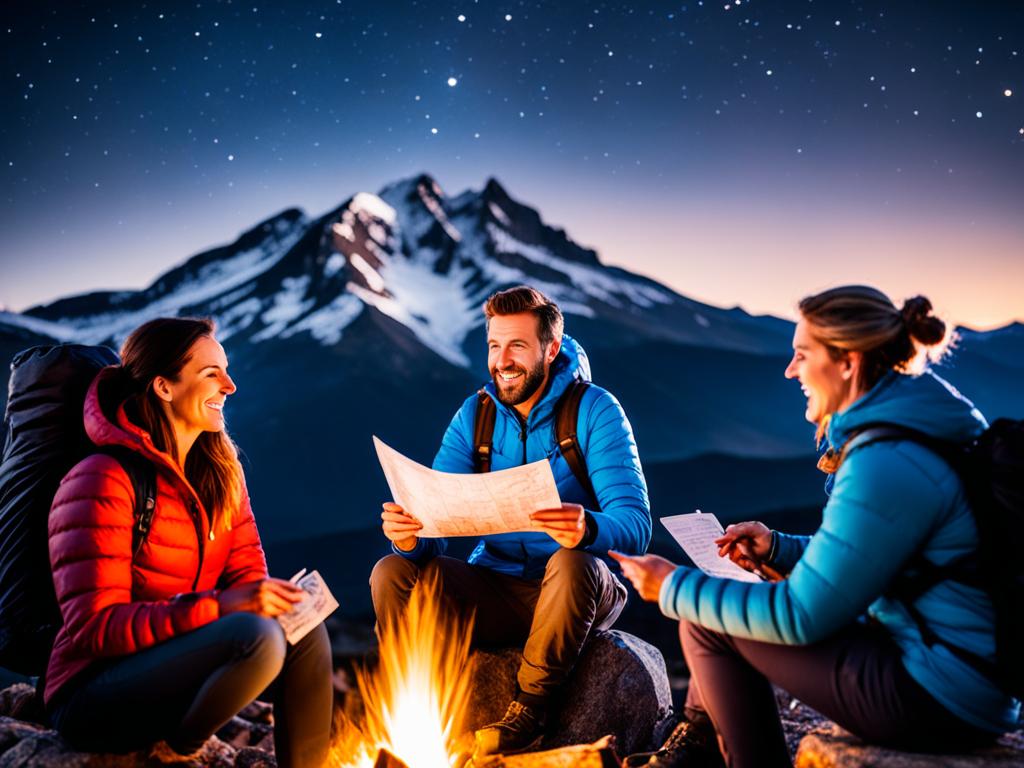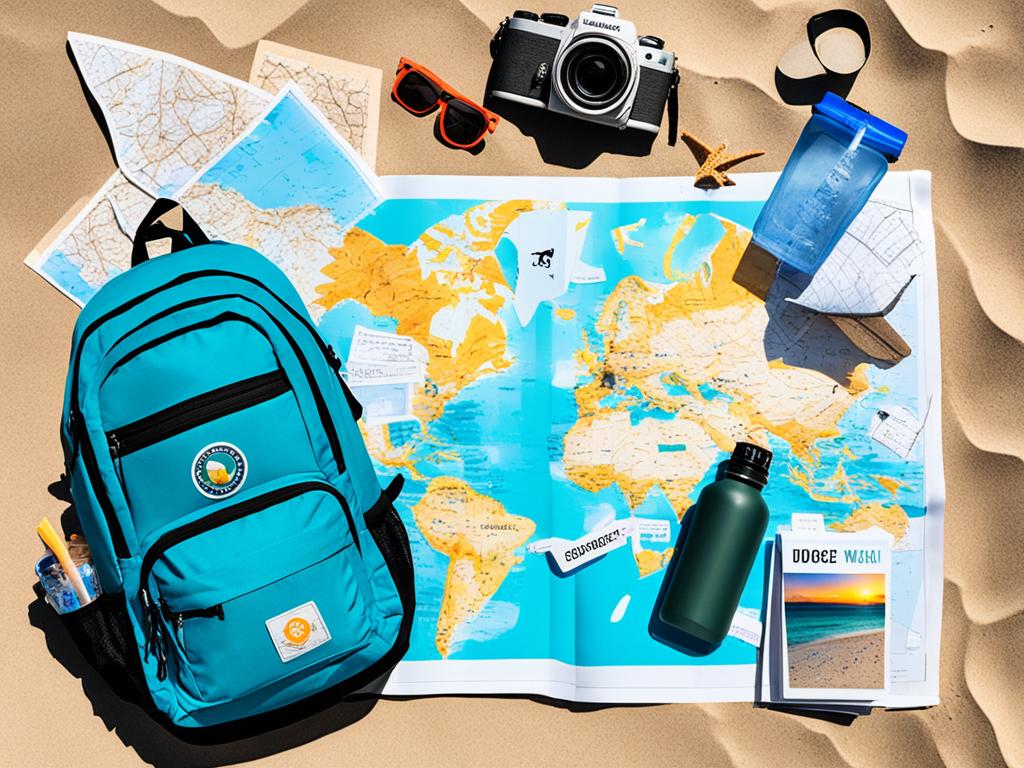Expert Travel Tips for Stress-Free Adventures
Embarking on a new journey should fill you with excitement, not stress – and that’s where the best travel tips come in handy. Esteemed travel enthusiasts like Rick Steves have long inspired explorers to venture out with confidence. Taking a leaf from such experts, we’ve collated top travel tips and tricks to ensure your trips are filled with joy and free from hassle. Whether navigating the labyrinth of tour companies or contributing to the vibrant community of TripAdvisor, these unique travel tips turn complicated logistics into simple travel solutions. Beyond the logistics, keeping a travel journal offers a tangible keepsake of your adventures, enabling you to relish past escapades time and again. Follow our essential guide, laced with a list of travel insights, as you plan to conquer new territories with serenity and zest.
Key Takeaways
- Adopt travel tips from experts like Rick Steves for an enriched journey.
- Utilize platforms such as TripAdvisor and reputable tour companies for planning.
- Incorporate travel tips and tricks to navigate and engage with ease.
- Maintain a travel journal to capture the essence of your experiences.
- Embrace simple travel tactics for a more enjoyable and organized trip.
- Keep abreast of the best travel tips to enhance each unique trip you undertake.
Essential Packing Tips for Any Destination
Packing efficiently is pivotal to a stress-free travel experience. Whether you’re globe-trotting for weeks or setting off on a quick weekend getaway, mastering the skill of packing can significantly enhance your trip. Dividing your packing list into essentials and nice-to-haves will help keep your luggage lean and functional. In this section, we delve into the most effective strategies and tools to pack smart, ensuring you have everything you need without the burden of over-packing.
The Art of Packing Light: Suitcase vs. Backpack
If you’re torn between choosing a walking tour or exploring on your own with a suitcase, or a backpack for your next journey, consider the nature of your trip. Backpacking offers mobility and simplicity, ideal for destinations with uneven terrain or lots of movement. Suitcases, on the other hand, can provide organized compartments and protection for delicate items, suitable for city travel or business trips. Here are some tips for traveling light, regardless of your choice:
- Use compression bags or packing cubes to optimize space.
- Select versatile clothing that can be mixed and matched.
- Follow the rule of threes: three tops for every bottom.
- Wear your heaviest items during transit to save luggage space.

Choosing Travel-Size Essentials: Save Space and Avoid Hassles
Travel-size items are indispensable for the savvy traveler aiming to pack light. They save significant space in your carry-on and allow you to adhere to airline liquid restrictions. Whether it’s toiletries, tech gadgets, or first aid items, downscaling your necessities makes a difference.
- Opt for travel-sized toiletries or use reusable containers.
- Select multi-purpose tools and mini-electronics.
- Bring concentrated formulas like concentrated detergent sheets.
- Choose a compact travel-size first aid kit.
Must-Have Items: First Aid Kit, Adapter, and More
No matter where your travels take you, some items are universally essential. A well-stocked first aid kit, for example, is non-negotiable for handling minor injuries or health issues on the go. Equally important is an adapter compatible with your electronics to keep them charged and ready. Here are other must-have items:
- Earplugs: For uninterrupted sleep in noisy environments.
- Adapter: To connect electronic devices in different countries.
- Luggage scale: Avoid extra fees for overweight baggage by adhering to your airline’s baggage policy.
- Money belt or security pouch: To safeguard valuables.
Employing these packing tips will not only help you pack light but also ensure you are well-prepared for virtually any travel scenario. Remember, smart packing is less about the quantity and more about the quality of what you bring along.
Planning Your Itinerary: Research and Booking Strategies
Embarking on a journey involves more than just selecting a destination; it requires careful research of your destination to create a memorable experience. The itinerary is your blueprint; a guidebook in hand or a well-planned travel agenda can ensure you make the most of each day in the destination country. Whether you’re going to visit bustling cities, serene beaches, or majestic mountains, the essence of travel lies in the places you visit.

Before you embark on your next adventure, consider these essential steps:
- Research ahead of time: Dive into the culture, history, and attractions of where you’re going. This preliminary step not only fuels your excitement but also informs the practical side of planning, such as determining visit durations and opening hours.
- Identify must-see locations: Make a list of all the landmarks, eateries, and neighborhoods you want to explore. Cross-reference your finds with trusted travel forums and recent travelers’ reviews to get the latest insights.
- Optimize your route: Craft an itinerary that flows logically from one site to the next, minimizing travel time and maximizing exploration. Be mindful of your energy levels and create a balanced schedule that includes time to rest and reflect.
A dynamic approach to booking accommodations and experiences offers both stability and spontaneity. Secure the essentials in advance to avoid disappointment, but leave room in your itinerary for impromptu adventures that speak to the heart of travel. Keeping a digital or printed copy of your itinerary, along with reservation details, ensures you’re prepared for the day’s journey.
Remember, the goal of travel is not to tick off every item on a list but to discover and engage with a new world. Let your itinerary be a guide, not a constraint. Flexible planning allows you to seize opportunities that arise unexpectedly, enriching your experience.
Setting the groundwork with thorough research and booking strategies pays dividends in the ease and enjoyment of your trip. Use this guide as your starting point, and remember that the true adventure begins when you step out into the world, itinerary in hand, ready to embrace the wonders of the places you visit.
Travel Tips to Make Your Journey Seamless
Navigating new places, languages, and cultures can be thrilling, but without proper preparation, it can also be stressful. Fortunately, a few savvy travel tips can make all the difference. From mastering Google Maps to sidestepping tourist traps, the key to a seamless journey is in your pocket—literally. Smartphones have become the ultimate travel companions, aiding in everything from directions to avoiding scams. Embracing these tools and insights ensures your adventure is as smooth as it is memorable.
Utilizing Google Maps and Offline Resources
To begin with, Google Maps is an invaluable asset for travelers. The ability to download the map of your destination means you can navigate with ease, even without a data connection. Before you set off, take a moment to download the map of the areas you plan to visit. Not only does this save on data costs, but it also ensures that you have access to maps even in areas with spotty internet connections. This simple step is one of the most essential travel tips to make your journey trouble-free.
Navigating Foreign Transportation Like a Local
No one wants to stick out as a tourist when trying to get from A to B. By researching and understanding the local transportation systems, you can maneuver through your destination as confidently as the locals do. Buses, trains, and subways often have apps or websites that can provide you with real-time updates and schedules. Using these tools, paired with your downloaded maps, will foster a smoother, more authentic travel experience, allowing you to navigate intertwined streets, remote paths, and bustling transit hubs with agility.
Avoiding Common Scams and Pickpockets on the Go
Even the most seasoned travelers can fall victim to a scam or pickpocket incidents can be avoided by being mindful and prepared, especially when you’re traveling in crowded areas of a foreign country. without vigilant care. It pays to be informed of the common cons of your destination. Here are some tips to help you steer clear of unwanted situations:
- Always be cautious of unsolicited help at ATMs or tourist sites.
- Keep valuables in a secure and concealed place, preferably in inner pockets or a money belt.
- Be wary of distractions or commotions, as they can be ploys for pickpocketing.
Use the table below to quickly understand common scams you may encounter and ways to avoid them:
| Common Scam | How it Happens | Best Ways to Avoid |
|---|---|---|
| Overcharged Fares | Taxi drivers may claim the meter is broken or take a longer route. | Agree on a price before the trip or insist on using the meter. |
| Fake Tickets | Street vendors sell counterfeit tickets for transport or attractions. | Purchase tickets from official sales points or through verified apps. |
| Pickpocketing | Thieves distract you with a map or spill something on you. | Stay attentive to your surroundings and keep your belongings secure. |
Embarking on your travels equipped with these practical tips and tools, your experiences can be more about the sights and sounds and less about the stresses of navigating and dodging scams. So go ahead, explore like a local, and make each trip your best one yet.
Money-Saving Hacks: Budgeting for Your Adventure
Embarking on a journey doesn’t have to deplete your bank account. With a few savvy strategies and insights, your adventure can be both economical and memorable. Whether you’re backpacking across continents or planning a local retreat, careful budgeting paired with strategic choices can unlock a world of affordable opportunities.
Finding Affordable Accommodations: Hostel and Budget Hotel Tips
One of the most effective ways to save money on travel is to opt for affordable accommodations. Staying in a hostel not only reduces lodging expenses but also offers a chance to meet fellow travelers. Similarly, booking a budget hotel can be a cost-efficient choice without sacrificing basic comforts. It’s all about balancing cost with convenience to find the best value for your stay.
How to Save on Meals: Street Food and Local Eateries
To save on meals, immerse yourself in the local food scene. Street food can be a delightful experience, but it’s ok to be cautious and pick vendors that seem the most popular among locals. vendors provide flavorsome and affordable options that reflect the culinary heart of a culture. Additionally, choosing to eat where the locals do can lead to discovering delicious yet budget-friendly dining spots away from the tourist traps.
Travel Credit Cards and Loyalty Programs: Are They Worth It?
The right travel credit cards can be a powerful financial tool for travelers. Looking beyond their credit aspect, these cards often come packed with rewards programs, offering everything from free stays to travel insurance. Paired with loyalty programs from airlines and hotels, smart use of these cards can lead to significant savings and numerous travel perks.

Health and Safety: Preparing means you’re setting yourself up for a smoother travel experience, no matter if it’s domestic travel or an adventure in a foreign country.
When journeying to new destinations, especially in a foreign country, the importance of health and safety during domestic travel cannot be overstated. Adequate preparation for the unexpected can transform a potential crisis into a manageable situation. An essential part of this readiness is ensuring that you are equipped with comprehensive travel insurance, which shelters you from the financial impact of unforeseen medical expenditures or cancellation fees due to emergencies. It’s about being as proactive in your approach to health as you are eager in your travel ventures.
Preparing an actionable health and safety plan includes carrying a well-stocked first aid kit—your frontline defense in the face of minor injuries or common ailments. Knowledge is power; knowing where to find and how to access medical care at your destination gives you a stronghold on health matters. Awareness of local safety measures, such as emergency numbers and health advisories, can significantly impact your ability to respond to precarious situations swiftly and efficiently.
To heighten your preparedness, here is a simple checklist envisioning a guardrail against the odds:
- Investigate the health care system of your destination and jot down emergency contacts.
- Inform your loved ones of your itinerary and check in with them consistently.
- Store a copy of your travel insurance policy on your person and in your digital cloud.
- Include essential medications and first aid accessories tailored to your health needs.
In the spirit of preparing for health and safety challenges, consider the following table, which aids in distinguishing the essentials for your travel preparedness toolkit:
| Item | Reason for Inclusion | Notes |
|---|---|---|
| Travel Insurance Info | Covers medical expenses/cancellations | Ensure policy terms are clearly understood |
| First Aid Kit Contents | Addresses minor ailments and injuries | Customize to personal and destination-specific risks |
| Local Emergency Contacts | Quick access during critical situations | Include embassies, hospitals, and local authorities |
| Healthcare Facilities Info | Understand where to go if medical care is needed | Research and note the nearest quality facilities |
By embedding a consideration for health and safety into your travel agenda, you instill confidence in your capacity to handle the unexpected. Ensure every item ticked, every measure taken, is an investment towards the most invaluable asset on your travels—you.
Conclusion
Our exploration of the best travel approaches has culminated in a rich tapestry of advice meant to ease the complexities of journeying afar. Each segment of these travel tips is a thread in the backpack of any explorer, whether seasoned or novice. They aim to equip you with knowledge that illuminates the winding paths of travel—from mastering the simplicity of a single backpack to ensuring you’re safeguarded by travel insurance for a domestic jaunt or an expansive long trip.
Reflecting on Travel Lessons and Embracing New Experiences
Looking back on the slew of strategies curated for you, remember that travel is as much about the sights you witness as the person you become along the way. To pack light is to unburden the spirit, letting you soar into the adventure ahead. Embracing tips like utilizing free Wi-Fi to stay organized or learning to adapt to sudden cancellations is not just about the trip—it’s about growth. By taking these tips to heart, you make your trip an illustration of life’s vibrant canvas.
Sharing Your Story: Engage with Fellow Travelers and Locals
The conclusion of your travels should not be a silent retreat to familiarity, but an opportunity to plan your next adventure, maybe considering a new domestic travel destination. Instead, it invites you to engage in the grand tradition of storytelling. Share your experiences with fellow wanderers and the friends you’ve met on this spinning globe. Whether through top posts in travel forums or recounting tales amongst your community, your journey can inspire and guide. Remember: To make mistakes is human, and to travel is to err and learn. Don’t beat yourself up for the unexpected detours; they’re evidence that you’ve lived a story worth recounting. Now, take these travel tips and weave them into your next great exploration, where it’s perfectly okay not to know every detail because that’s where your next adventure begins.
FAQ
What are some of the best travel tips for a stress-free journey?
Some top travel tips for a stress-free journey include planning your itinerary ahead of time, packing light, staying organized, keeping a travel journal, and researching your destination through resources like guidebooks and TripAdvisor. Engaging with tour companies for local experiences can also add immense value to your adventure.
How can I pack more efficiently?
To pack efficiently, focus on the art of packing light by choosing whether a suitcase or backpack best suits your mobility needs. Opt for travel-size essentials to save space, and always include items like adapters, earplugs, and a first aid kit. Rolling clothes instead of folding and utilizing packing cubes can help maximize space in your carry-on or luggage.
What should I consider when planning my itinerary?
When planning your itinerary, you should research your destination country ahead of time to uncover hidden gems and get an idea of the places you want to visit. Consider booking accommodations and activities early to ensure availability, but also remain flexible to adapt to new opportunities or changes in your plan.
How can I navigate a new city like a local?
To navigate a new city like a local, use Google Maps and download offline maps before you go. Familiarize yourself with the public transportation system and consider purchasing a local SIM card for on-the-go information. Also, try walking or renting a bike to explore areas inaccessible via public transport.
What are some effective ways to save money while traveling?
You can save money by staying in hostels or budget hotels, enjoying street food and local eateries, and using travel credit cards with loyalty programs to earn rewards and receive discounts. Additionally, consider traveling during off-peak seasons, using local transportation, and looking for free attractions or activities.
How do I prepare for health and safety issues when traveling?
Prepare for health and safety by purchasing comprehensive travel insurance, packing a first aid kit, and familiarizing yourself with local emergency numbers and healthcare facilities. Stay informed about health advisories for the country you’re visiting, and always keep emergency contacts updated about your whereabouts.
What should I do if I encounter a scam or pickpocket while traveling?
If you encounter a scam or pickpocket, remaining calm and assertive, means you’re capable of handling stressful situations. It’s crucial to stay informed about common scams at your destination. Always keep your valuables secure and out of sight, opt for a money belt or a hidden pouch, and be cautious when interacting with strangers. If you are scammed or robbed, report it to the local police and your consulate if necessary.
What are the benefits of keeping a travel journal?
Keeping a travel journal allows you to record memorable experiences, reflect on your journey, and keep track of places visited, people met, and personal thoughts. It’s a great way to preserve the details of your adventures and can be a valuable resource for future travels or sharing insights with fellow travelers.
Are travel credit cards and loyalty programs worth considering?
Travel credit cards and loyalty programs can be very beneficial for frequent travelers. They often come with perks like rewards points, travel insurance, and access to airport lounges. Before applying for one, compare different cards to find one that best suits your travel habits and offers the most advantages for your needs.







No Comments